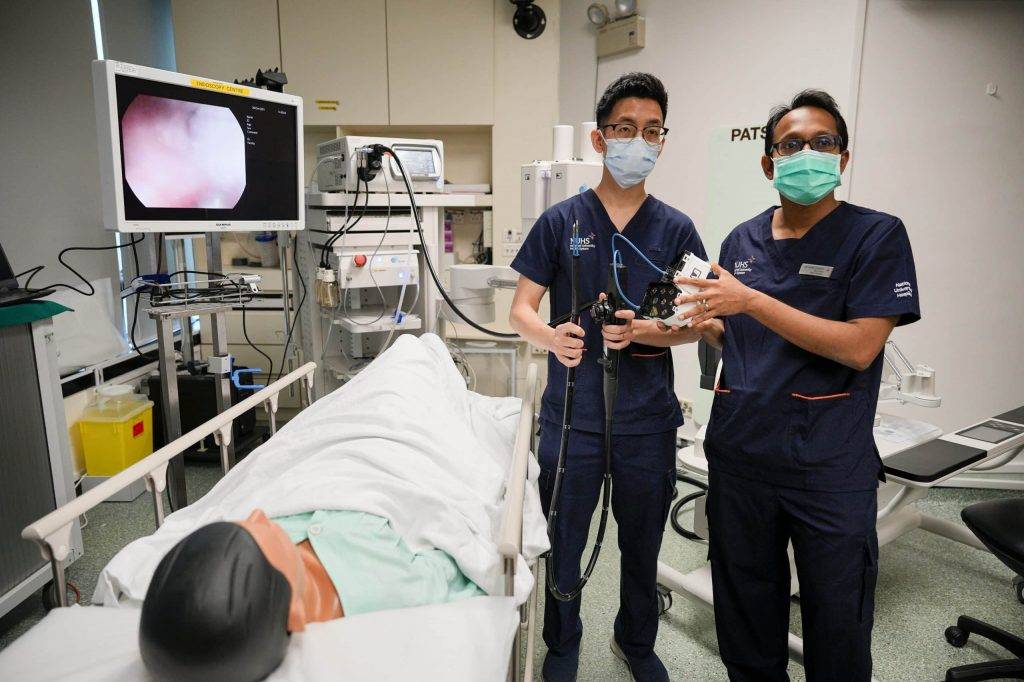NUH is launching the National University Centre for Digestive Health. By integrating AI and high-tech solutions, it aims to advance early cancer detection and improve specialised care.
The Centre will feature pioneering research and clinical practices for digestive health focused on elevating standards in disease detection, precise diagnosis, and prevention of digestive illnesses. It is scheduled to open in 2025.
This Centre will be among the first in Singapore to implement three AI-powered systems: CADe, CADx, and CAQ. These systems enhance the identification and real-time diagnosis of gastrointestinal lesions, potentially leading to earlier and more effective treatments. This integration aims to improve treatment outcomes and prognoses for patients with high-risk lesions indicative of cancer.
Upgraded Endoscopy Centre for Digestive Health
Additionally, NUH has upgraded its Endoscopy Centre to meet the growing needs of an ageing population and the rising incidence of gastrointestinal cancers. The expanded facility includes new procedure rooms, additional recovery bays, and dedicated spaces for triage and counselling. This expansion supports the anticipated increase in screening endoscopies driven by HealthierSG initiatives.
Since August 2023, the Endoscopy Centre has used the Artis Q system, the first in Southeast Asia. This system offers advanced 3D imaging that enhances surgeons’ ability to locate diseased tissues and identify potential issues not visible with traditional 2D imaging. It also minimises radiation exposure by calculating the optimal dose for each patient.
Correlation Between Gastrointestinal (GI) Cancer, Digestive Health and Ageing
The correlation between gastrointestinal (GI) cancer and ageing is significant and well-documented. Here are the key aspects that illustrate how ageing is linked to an increased risk of developing gastrointestinal cancers:
Cellular Aging
As individuals age, the body’s cells undergo various changes, including DNA damage accumulation, telomere shortening, and decreased cellular repair mechanisms. These changes can lead to mutations that increase the risk of cancer development. These age-related cellular changes can be particularly pronounced in the gastrointestinal tract, where cells are frequently turning over due to constant exposure to various substances.
Immunosenescence
Aging is associated with a decline in immune system function, known as immunosenescence. This decline can reduce the body’s ability to detect and destroy pre-cancerous or cancerous cells, allowing them to increase in the GI tract.
Chronic Inflammation
Older adults often experience chronic, low-grade inflammation, known as “inflammaging.” This condition can contribute to a pro-carcinogenic environment in the body, promoting the growth and spread of cancer cells, particularly in the gastrointestinal system.
Increased Exposure to Risk Factors
With increasing age, there is also a more prolonged cumulative exposure to various risk factors for gastrointestinal cancers. These include dietary factors, obesity, smoking, and chronic infections such as Helicobacter pylori, which is linked to gastric cancer.
Changes in Gastrointestinal Microbiota
Additionally, ageing is associated with changes in the composition and function of the gut microbiota, which is crucial in maintaining GI tract health. Dysbiosis, or an imbalance in these microbial communities, has also been linked to increased inflammation and changes in the gut lining that could predispose individuals to cancer.
Prevalence of Precancerous Conditions
Older adults are more likely to have precancerous conditions such as polyps in the colon or Barrett’s oesophagus. Consequently, these can evolve into cancer over time. Therefore, regular screening is often recommended for older adults to detect such conditions early.
New Robotic System
Another significant addition at NUH is the introduction of the EndoMaster Robotic System. This novel robotic system allows incision-less removal of gastric and colon tumours through natural orifices. This technology reduces surgery time and patient discomfort and enhances recovery. Additionally, clinical trials have shown reduced complication rates and hospital stays.
Adjunct A/Prof Lee Guan Huei, Head and Senior Consultant, Division of Gastroenterology and Hepatology, Department of Medicine, NUH, said: “At the forefront of our mission within the National University Centre for Digestive Health is the fusion of AI and advanced technologies with deep clinical expertise. This signifies our commitment to innovation and dedication to offering our patients the best experience and most advanced care options possible.”
Associate Professor Asim Shabbir, Head & Senior Consultant, Department of Surgery, NUH, said: “At the National University Centre for Digestive Health, we are continuously striving for better outcomes where treatment is less invasive, more effective, and tailored to the individual needs of each patient. Introducing new technologies, like the EndoMaster Robotic System, into our surgical practices will be a game-changer. As we continue to expand our infrastructure and embrace technological advances, the Centre is poised to redefine digestive health for the future.”
Photo Credit: NUHS
Photo Caption: Demonstration of the robotic endoscopic submucosal dissection (ESD) system by Dr Mark Muthiah and Dr Koo Chieh Sian

